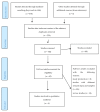The Impact of Nutrition and Intestinal Microbiome on Elderly Depression-A Systematic Review
- PMID: 32156003
- PMCID: PMC7146624
- DOI: 10.3390/nu12030710
The Impact of Nutrition and Intestinal Microbiome on Elderly Depression-A Systematic Review
Abstract
The aim of this review is to systematically review the evidence whether proper nutrition has a positive impact on the prevention or decline of depressive symptoms among elderly people. In addition, possible connections between nutrition, microbiome, and serotonin molecules and its tryptophan precursor are discussed. The methodology follows the PRISMA guidelines, including the PRISMA flow chart. The authors systematically reviewed peer-review, English-written articles published in Web of Science and PubMed between 2013 and 2018. The findings of six original articles, detected on the set inclusion and exclusion criteria, indicate that there is an association between nutrition and depressive symptoms in the target group, i.e., that proper nutrition has a positive impact on the prevention or reduction of depressive symptoms among elderly people. The findings also reveal that there is a considerable correlation between the intakes of vitamin B and a decrease in the prevalence of depressive symptoms. Furthermore, sufficient nutrient intake of tryptophan appears to be an important factor in terms of nutrition and serotonin levels in the body. The authors consider it important to explore associations between the overall dietary intake and depression since diets are not consumed as individual nutrients. Returning to preventive approaches seems to be a rational way to promote the mental health of seniors. Future studies thus need to include interdisciplinary collaboration: from a good diagnosis of the disease by a psychiatrist, through an analysis of the need for nutrient metabolism by a biochemist to the development of a nutritional plan by a nutritional therapist. The limitations of this review consist in a relatively small number of the studies on this topic, including just few randomized controlled trials, which are a guarantee of efficacy and objectivity in comparison with cross-sectional studies.
Keywords: depression; elderly; gut-brain axis; microbiome; nutrition; serotonin; tryptophan; vitamin.
Conflict of interest statement
The authors declare no conflict of interest.
Figures
References
-
- World Health Organization Mental Health of Older Adults. [(accessed on 23 January 2019)]; Available online: https://www.who.int/news-room/fact-sheets/detail/mental-health-of-older-....
-
- Maresova P., Klimova B. Non-pharmacological approaches in the depression treatment—Strengths and weaknesses of mobile applications use. In: Oliver N., Serino S., Matic A., Cipresso P., Filipovic N., Gavrilovska L., editors. Pervasive Computing Paradigms for Mental Health. Springer; Cham, Switzerland: 2018. MindCare 2016, FABULOUS 2016, IIOT 2015. Lecture Notes of the Institute for Computer Sciences, Social Informatics and Telecommunications Engineering 207.
-
- World Health Organization Depression: Definition. [(accessed on 23 January 2019)]; Available online: http://www.euro.who.int/en/health-topics/noncommunicable-diseases/pages/....
-
- WebMD—Better Information. Better Health Depression in Special Situations. [(accessed on 23 January 2019)]; Available online: https://www.webmd.com/depression/guide/depression-in-special-situations#1.
Publication types
MeSH terms
Substances
LinkOut - more resources
Full Text Sources
Medical


